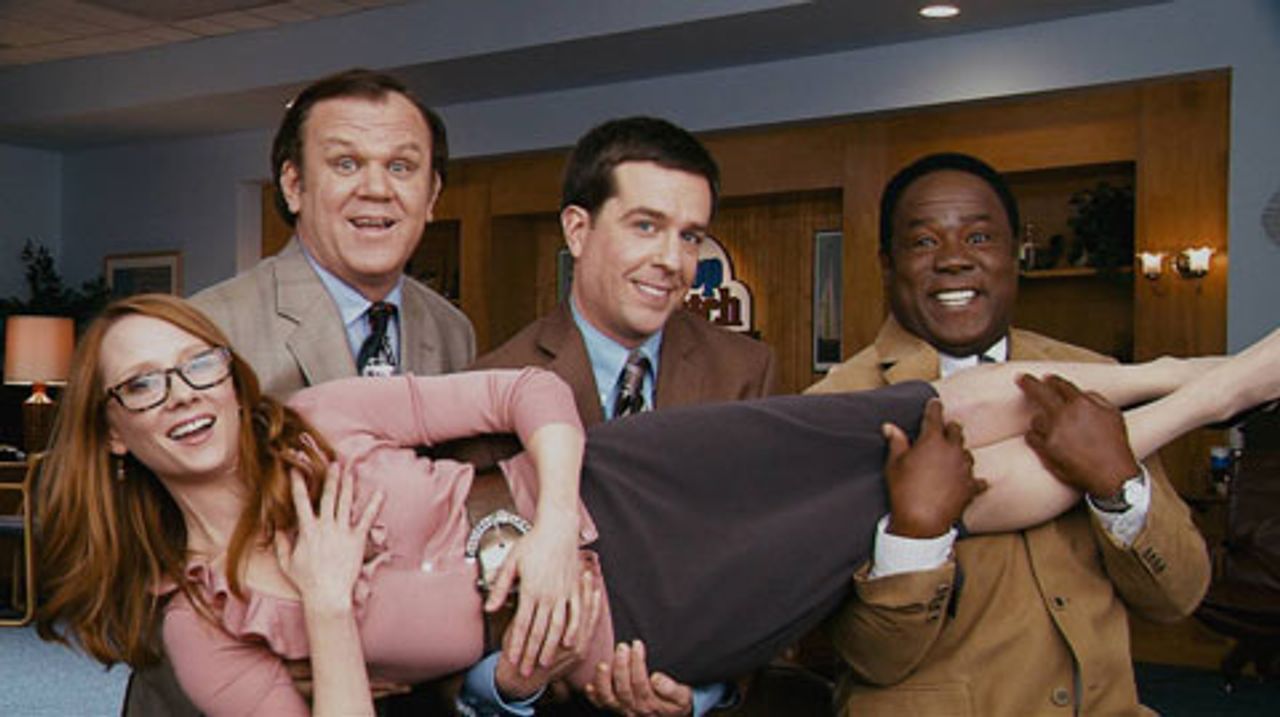Directed by Miguel Arteta, screenplay by Phil Johnston
 Cedar Rapids
Cedar RapidsTim Lippe (Ed Helms) is a sheltered insurance agent from a small town in Wisconsin in Cedar Rapids, a comedy directed by Miguel Arteta (born 1965 in San Juan, Puerto Rico). When a fellow agent dies in questionable circumstances, Lippe is sent by the firm to a regional convention in Cedar Rapids, Iowa. His mandate is to win an industry award that has been bestowed on his company several years in a row.
The film’s premise is that Lippe has never set foot outside his town, traveled in an airplane or spent a night in a hotel. In Cedar Rapids (metropolitan area population of 250,000), Lippe encounters three insurance convention veterans, Ronald Wilkes (Isiah Whitlock Jr.), Dean Ziegler (John C. Reilly) and Joan Ostrowski-Fox (Anne Heche), who show him the ropes. Lippe’s boss has specifically warned him to avoid Ziegler, a fast-talking, foulmouthed hustler.
Religion and patriotism (“community, country and God”) dominate the convention’s tedious official proceedings, presided over by the seemingly virtuous Orin Helgesson (Kurtwood Smith). In fact, a petition is circulating to rescind the awards given to Lippe’s agency because of the “ungodly” behavior of his predecessor.
Needless to say, after overcoming his initial hesitation, Lippe cuts loose in Cedar Rapids, singing in a talent contest, dancing at a gay wedding reception, swimming drunkenly in the hotel pool in the middle of the night, sleeping with the married Joan, partying and doing drugs with a prostitute, and more.
He also learns that beneath the pious façade, corruption and betrayal pervade his trade association. Lippe returns to his hometown a somewhat changed man.
There are some laughs here, most of them provided by John C. Reilly as the slovenly, quick-on-his-feet Ziegler. Anne Heche is also appealing as the goodhearted Joan, who offers some comfort and consolation to Lippe in his hour of crisis. Whitlock (The Wire), as the most “white bread” of African Americans, and Alia Shawkat (wonderful as Maeby Fünke in Arrested Development) as Bree the prostitute, are fine.
Ed Helms (The Office, The Daily Show) is less effective as Lippe; his character fails to add up, but this might have something to do with the implausibilities of the script.
The spectator is asked to accept that Lippe, successful enough at his business to be sent to a trade convention, is so abjectly inexperienced at modern life that he is reluctant to use a credit card and can’t recognize a streetwalker when one approaches him. Small-town life may have isolated Lippe from many aspects of existence, but there are such things as televisions, movie theaters and computers. Where has he been living?
Moreover, the filmmakers, somewhat unexpectedly, have provided Lippe with a lover back in Wisconsin, his former elementary school teacher, the recently divorced Macy Vanderhei (Sigourney Weaver), twenty-five years his senior! Does it make sense that such a repressed and reticent individual, burdened with upright Christian morals, no less, would pursue a torrid, unusual affair of that sort? The writer and director want to have their cake and eat it too.
Nor can the filmmakers decide whether Lippe is naïve, childlike or simply childish. In any event, when he breaks down and cries, he is merely irritating.
The conclusion of the film, with the insurance agent revealing how he sold his soul to get ahead, is unconvincing and undramatic.
Overall, the events are too petty to arouse one’s interest to any large extent. Reilly is energized much of the time, but one feels Heche occasionally somewhat bemused by the smallness of her words and actions.
The decline of American film comedy, once one of its popular artistic claims to fame, has gone hand in hand with the overall cultural and intellectual deterioration of the past several decades. As late as the 1960s and early 1970s (Blake Edwards, Frank Tashlin, the aging Billy Wilder, George Axelrod and more), Hollywood could still pursue comedy with urgency and seriousness.
Now, for the most part, almost anything goes. Film writers seem to have inherited from contemporary television sketch comedy the notion that one or two semi-clever ideas will suffice. Everything else can be filled in lazily and haphazardly. Plot and character coherence count for almost nothing. The public’s attention is diverted from the generally trivial concerns by over-the-top acting and extreme set pieces, or adolescent “toilet” humor, distorting the movies out of any believable proportions.
In Cedar Rapids, the latter elements are largely, although not entirely, missing, so the lack of intensity and commitment registers more directly.
The actors are not to blame. Reilly is as good as any character actor one can name and Heche, although not in the category of a Jean Arthur or Barbara Stanwyck as an educator of bumpkins, is no slouch.
There is no shortage of likely targets for humor in American life. Daily events offer up far more than their share of hypocrites, charlatans and Tartuffes. The declarations by politicians of both major parties, exercises in self-parody, could only be composed, one often feels, by individuals possessed of a rich sense of humor.
Bound up with many filmmakers having little to say is the problem of not understanding very much about one’s own society and how people actually get along, or fail to get along, in it.
The leading figure in Cedar Rapids is from Wisconsin. And everyone knows, the film’s central comic conceit would have it, that Wisconsin is a backwater, the most subdued and tranquil corner of the country. Nothing ever happens in Wisconsin.
What can one say?
Truly, Hollywood filmmakers have their finger on the pulse of the nation.
